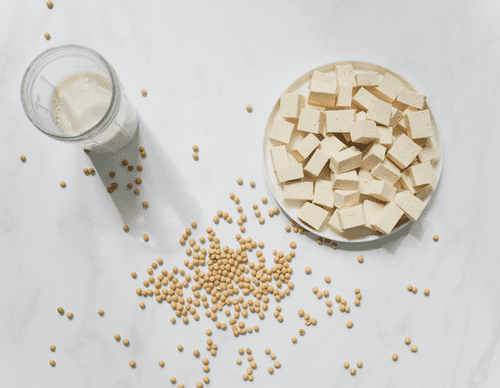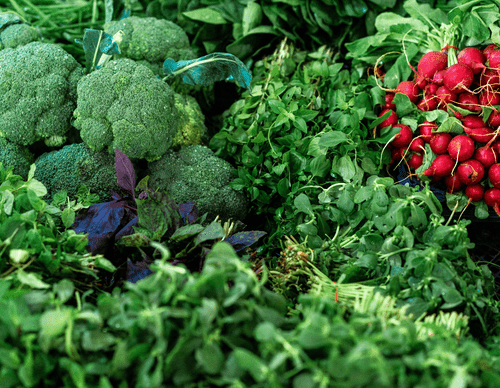Vegan diets can lack essential nutrients, including calcium, lets learn about the best vegan calcium source.
So, The best vegan calcium source. Include fortified plant milks and juices, tofu, almonds, dark leafy greens (such as kale and bok choy), and calcium-set tofu. Additionally, calcium-fortified products like breakfast cereals, plant-based yogurt and non-dairy cheese are great options.
To ensure adequate calcium intake, it is recommended to consume a variety of these sources throughout the day. Calcium is important for strong bones and teeth and is one of the most essential nutrient.

Table of Contents
List Of 7 Best Vegan Calcium Sources
- Fortified plant milks and orange juice
- Leafy greens such as kale, collard greens, and bok choy
- Almonds
- Tofu
- Sesame seeds and tahini
- Blackstrap molasses
- Fortified cereals and grains.

Calcium Deficiency And Source To Avoid It
Do vegans suffer from calcium deficiency
Vegans can be at risk of calcium deficiency if they do not consume adequate amounts of calcium-rich foods or if they have limited access to fortified plant-based milks and other calcium-fortified foods. However, with proper planning and diet, it is possible for vegans to meet their calcium needs and avoid calcium deficiency.
Calcium is important for many functions in the body, including building strong bones and teeth, muscle contractions, and nerve function. The recommended daily intake of calcium for adults is 1000-1300 milligrams per day, depending on age and gender.
Vegans can meet their calcium needs through consuming calcium-rich plant-based foods such as leafy greens, fortified plant-based milks, almonds, tofu, sesame seeds and tahini, blackstrap molasses, and fortified cereals and grains.
It is important for vegans to be mindful of their calcium intake and to regularly consume calcium-rich foods. If a vegan is concerned about their calcium levels, they should talk to a doctor or a registered dietitian for personalised advice. Additionally, supplements can be taken if necessary to ensure adequate calcium intake.

7 best vegan source of calcium
- Fortified Plant Milks and Orange Juice: Many plant-based milks and orange juices are fortified with calcium, providing between 30-100% of the daily recommended value in a single serving. Examples include soy milk, almond milk, oat milk, and rice milk.
- Leafy Greens: Leafy greens like kale, collard greens, and bok choy are high in calcium and other nutrients. A single cup of cooked kale, for instance, contains almost 200 milligrams of calcium.
- Almonds: Almonds are a good source of calcium, with a 1/4 cup serving providing around 100 milligrams. They also contain healthy fats and protein, making them a great snack option.
- Tofu: Tofu is made from soybeans and is often fortified with calcium. A single serving can provide between 200-500 milligrams of calcium, depending on the brand.
- Sesame Seeds and Tahini: Sesame seeds and tahini, made from ground sesame seeds, are high in calcium. Two tablespoons of tahini contain around 128 milligrams of calcium.
- Blackstrap Molasses: Blackstrap molasses is a byproduct of sugar refining and is high in calcium, iron, and other minerals. One tablespoon of blackstrap molasses contains around 65 milligrams of calcium.
- Fortified Cereals and Grains: Some cereals and grains are fortified with calcium, providing a convenient way to increase your intake. Examples include oatmeal, cereal, and bread. Check the label to see how much calcium is in a serving.
13 calcium-rich foods
Here are some calcium-rich foods that vegans and non-vegans alike can enjoy:
- Chia seeds: Two tablespoons of chia seeds contain around 180 milligrams of calcium.
- Dried figs: A quarter cup of dried figs provides around 50 milligrams of calcium.
- Navy beans: A cup of navy beans contains around 126 milligrams of calcium.
- Lentils: A cup of cooked lentils contains around 63 milligrams of calcium.
- Black-eyed peas: A cup of black-eyed peas contains around 94 milligrams of calcium.
- White beans: A cup of white beans contains around 131 milligrams of calcium.
- Tempeh: A half cup of tempeh contains around 174 milligrams of calcium.
- Sun-dried tomatoes: A quarter cup of sun-dried tomatoes provides around 50 milligrams of calcium.
- Figs: Two fresh figs provide around 40 milligrams of calcium.
- Mustard greens: A cup of cooked mustard greens contains around 102 milligrams of calcium.
- Turnip greens: A cup of cooked turnip greens contains around 99 milligrams of calcium.
- Artichokes: One medium artichoke contains around 60 milligrams of calcium.
- Okra: A cup of cooked okra contains around 116 milligrams of calcium.
Note: The exact amount of calcium in these foods may vary depending on factors such as preparation methods and serving size. It is important to also consider other factors that can affect calcium absorption, such as adequate vitamin D intake and limiting consumption of substances that interfere with calcium absorption, such as caffeine and high-sodium diets.

Calcium Rich Fruits
Calcium is a vital mineral for maintaining strong bones and healthy teeth. While dairy products are often thought of as the main source of calcium, there are also several fruits that contain this mineral.
Here are 10 fruits that are high in calcium:
Dried figs: Dried figs are a good source of calcium, with 100 grams providing approximately 64 milligrams of the mineral.
Oranges: Oranges are a good source of calcium, with 100 grams providing approximately 52 milligrams of the mineral.
Blackberries: Blackberries are a good source of calcium, with 100 grams providing approximately 50 milligrams of the mineral.
Guava: Guava is a good source of calcium, with 100 grams providing approximately 43 milligrams of the mineral.
Kiwi: Kiwi is a good source of calcium, with 100 grams providing approximately 41 milligrams of the mineral.
Pineapple: Pineapple is a good source of calcium, with 100 grams providing approximately 40 milligrams of the mineral.
Apricots: Apricots are a good source of calcium, with 100 grams providing approximately 36 milligrams of the mineral.
Papaya: Papaya is a good source of calcium, with 100 grams providing approximately 34 milligrams of the mineral.
Starfruit: Starfruit is a good source of calcium, with 100 grams providing approximately 30 milligrams of the mineral.
Gooseberries: Gooseberries are a good source of calcium, with 100 grams providing approximately 25 milligrams of the mineral.
It’s important to note that while these fruits are good sources of calcium, it’s still important to include other calcium-rich foods in your diet, such as fortified plant-based milks and leafy green vegetables. Additionally, it’s important to get enough vitamin D, as it helps your body absorb calcium. Sun exposure, fortified plant-based milks, and fortified foods are all good sources of vitamin D for vegans.
How can I increase my calcium naturally
As a vegan, it may be a bit more challenging to get adequate amounts of calcium, as dairy products are a major source of this mineral. However, there are still several plant-based options to choose from to help increase your calcium intake. Here are some tips:
One of the best sources of calcium for vegans is fortified plant-based milks such as soy, almond, or oat milk. These milks often have added calcium, which can help vegans meet their daily requirements. Additionally, some brands of tofu and certain types of green leafy vegetables, such as kale and broccoli, are also good sources of calcium. Nuts and seeds, such as almonds, chia seeds, and sesame seeds, also contain calcium and can be easily incorporated into a vegan diet.
Another way to increase your calcium intake as a vegan is to take a calcium supplement. Calcium supplements are available in various forms, including tablets, chews, and powders that can be added to drinks or food. However, it’s important to speak with your healthcare provider before starting any supplement regimen, as taking too much calcium can lead to health problems. In addition, calcium supplements are best absorbed when taken with food, so it’s recommended to take them with a meal or snack.

Do’s and don’ts to increasing your calcium intake as a vegan
Here are some dos and don’ts for increasing your calcium intake as a vegan:
Do:
- Choose calcium-fortified plant-based milks
- Eat leafy green vegetables
- Snack on nuts and seeds
- Try calcium-rich tofu
- Take a calcium supplement under the guidance of your healthcare provider
- Get enough vitamin D from sun exposure, fortified plant-based milks, and fortified foods
- Engage in weight-bearing exercises
Don’t:
- Avoid relying solely on calcium-rich fruits and vegetables, as they are also high in oxalates, which can interfere with calcium absorption
- Avoid high-oxalate foods such as spinach, rhubarb, and sweet potatoes, which can decrease calcium absorption
- Don’t exceed the recommended daily dose of calcium or take calcium supplements without first consulting with your healthcare provider
- Don’t consume excessive amounts of caffeine or alcohol, as they can interfere with calcium absorption
Remember, everyone’s nutritional needs are different and it’s important to work with your healthcare provider to determine the right approach for you.
Foods That Block Calcium Absorption
Calcium is an essential mineral for maintaining strong bones and teeth, and it’s important to ensure that your body is able to absorb as much calcium as possible. While there are many foods that can help increase calcium absorption, there are also some foods that can block or interfere with the body’s ability to absorb calcium.
High-oxalate foods: Foods that are high in oxalates, such as spinach, rhubarb, and sweet potatoes, can bind to calcium and prevent it from being absorbed. While these foods are still healthy and provide many other nutrients, it’s best to consume them in moderation and in combination with calcium-rich foods.
Phytic acid: Phytic acid is found in foods such as beans, lentils, whole grains, and seeds. It can bind to calcium and other minerals, making them less available for absorption by the body. Soaking, sprouting, or fermenting these foods can help reduce the phytic acid content and increase mineral absorption.
Excessive fiber: While fiber is important for maintaining digestive health, excessive amounts of fiber can interfere with calcium absorption. This is because fiber can bind to calcium and prevent it from being absorbed. It’s important to consume a balanced diet that includes a variety of high-fiber and calcium-rich foods.
Excessive caffeine: Consuming too much caffeine, such as from coffee, tea, or soda, can interfere with calcium absorption. Caffeine can cause the body to excrete calcium in urine, reducing the amount available for absorption.
Excessive alcohol: Like caffeine, excessive alcohol consumption can interfere with calcium absorption. Alcohol can reduce calcium absorption and also increase the excretion of calcium in urine.
Excessive sodium: Consuming too much sodium can increase the amount of calcium excreted in urine, reducing the amount available for absorption. It’s important to limit sodium intake and consume a balanced diet that includes a variety of calcium-rich foods.
It’s important to note that while these foods can interfere with calcium absorption, they are still healthy and should be included as part of a balanced diet. To ensure that your body is able to absorb as much calcium as possible, it’s important to consume a variety of calcium-rich foods, get enough vitamin D, and maintain a balanced diet that includes all of the essential nutrients your body needs.

